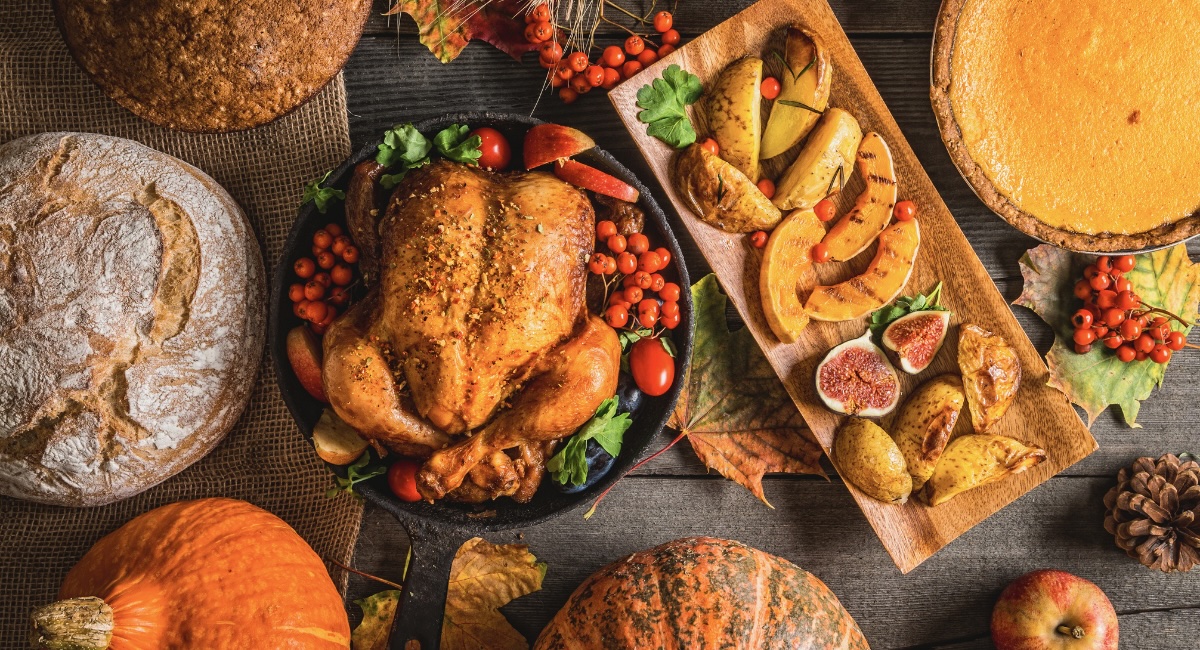
The holiday season is a time for celebration, family gatherings, and often indulgent meals. While it can be challenging to manage holiday weight gain during this festive period, staying mindful of your eating habits and physical activity can make a big difference.
Tryon Medical Partners internal medicine specialist Dr. Remmouche is double board certified in obesity medicine and shares a few simple strategies to savor holiday traditions while staying on track with your health goals.
Why is weight management important?
Dr. Remmouche knows firsthand how important, and how difficult, weight management can be. She was first introduced to the field of obesity medicine after the birth of her third child when she was struggling to lose the baby weight.
“I was at the YMCA at 5 a.m., five days a week, for 90 minutes every morning,” Dr. Remmouche shares. “That wasn’t enough, and I needed to better understand why the weight was staying on and how I could lose it.”
As a physician, she was well acquainted with the consequences of excess weight (cardiovascular issues like heart attack and stroke, chronic issues like diabetes) but felt like there was room for her to learn about weight management itself. She took an obesity medicine course and then the board exam and now uses it in her practice every day at Tryon Medical Partners.
“Learning more about weight management was a gift to myself but is also the gift that keeps on giving with my patients,” Dr. Remmouche says. “In working with my patients to manage their weight, chronic problems, like diabetes and blood pressure, are improving, too.”
What is the average weight gain over the holidays?
If the upcoming indulgent holiday meals fill you with a sense of dread about your waistline, you are in good company. Dr. Remmouche often hears concerns from patients as the holiday season nears.
“Many of my patients are coming to me frustrated and panicked,” Dr. Remmouche shares. “They experience this every year around the holidays and often feel so much guilt and shame that they schedule their annual physical long after the holidays, so they don’t have to acknowledge the holiday weight gain.”
Despite the concerns, Dr. Remmouche says that weight gain around the holiday season is quite minimal: average weight gain is between 0.8 and 2 pounds at the holiday season.
“However, weight gain does compound over time,” Dr. Remmouche advises. “If you stop exercising and eating well for two months over the holidays, you may only gain 1 pound. But if you see the weight gain and lose your motivation, it’s a vicious cycle and that might turn into many more pounds by the end of the year.”
What causes my weight gain during the holidays?
Of course, the holidays are filled with delicious, rich, and indulgent foods. However, weight gain over the holidays isn’t caused by food alone. Dr. Remmouche shares some other factors:
- Sleep. The holidays are so busy, people often neglect their sleep. Weight maintenance (and loss) depends on regular and high-quality sleep. At a baseline, the holidays happen during a season in which sleep can be disrupted. In the winter months, days are shorter and darker and the lack of natural light exposure can throw off our circadian rhythm. The circadian rhythm is increasingly recognized as a risk factor for metabolic issues, including obesity and insulin resistance. So it’s especially important to ensure you’re getting enough sleep.
- Exercise. In the cool winter months, it’s common to be less active. People aren’t as motivated to go to the gym because it’s dark outside, and many people struggle with seasonal depression, making them even less motivated. However, without consistent exercise, it is difficult to maintain, or even lose, excess weight.
- Alcohol consumption. Although sneaky, drinking alcohol more regularly during the holidays also contributes to issues managing winter weight. Within alcoholic beverages are excess calories you wouldn’t normally be drinking, that go unnoticed during the holiday season. Alcohol consumption can also cause inflammation in the body, leading to insulin resistance, which can eventually cause type 2 diabetes.
“Alcohol gives people a feeling of warmth, which is soothing during the winter months,” Dr. Remmouche says. “However, the consequences of drinking alcohol are much more severe than the benefits so it’s best to minimize it as much as possible, especially if you’re actively managing your weight.”
How can I manage my holiday weight gain?
In order to manage your weight successfully this holiday season, Dr. Remmouche recommends four key behaviors:
- Be mindful of what you’re eating. If you’re sitting at the dinner table and you are finished eating, go elsewhere so you’re not tempted to keep eating once you’re full. If you have leftovers, freeze them or give them away so you aren’t concerned about the waste. Finally, if you’re looking at the table and excited to eat it all, try sampling small amounts instead of eating full portions and overeating.
- Choose healthier options when you can. Desserts are a huge part of the holidays and should be approached with excitement and joy. However, make sure you eat some vegetables, lean protein, and healthy fat before digging into your dessert. This applies year-round, not just at the holidays: if you’re going to have something that will spike your blood sugar, have it with something rich in fiber or protein or even healthy fat. For instance, if you’re looking forward to some dark chocolate, pair it with nuts so that you don’t spike your insulin as much. This will leave you feeling better later. However, if you dream about a traditional holiday treat all year long, don’t deprive yourself of it when the time comes.
- Exercise. Eating is a part of the holidays, but exercising can be, too. Make sure to build in some strength training, ideally for 30-40 minutes, 2-3 times a week. Consistent exercise will help sustain weight loss you’ve already achieved. However, weight loss is 80-90% about eating an appropriate amount of nutrient rich food so most of your energy should be dedicated to picking healthier options when you can.
- Consider fasting. Intermittent fasting is an eating pattern that involves alternating between periods of fasting and eating. Dr. Remmouche recommends trying this a couple of times a week and working your way into fasting for longer stretches of time as part of an ongoing weight management strategy, not just around the holidays.
“Food is fuel and should mean much more than that during the holiday season,” Dr. Remmouche says. “Around the holidays, food means building memories with your family, honoring traditions and culture, and building social connection. Start by looking at food this way, rather than with guilt and frustration. Be mindful of what you’re eating, but make sure you’re enjoying the moment, too.”
If you want to get ahead of holiday weight gain through a conversation with a clinician, don’t wait. Use MedChat or call Tryon Medical Partners to discuss strategies and options today.

